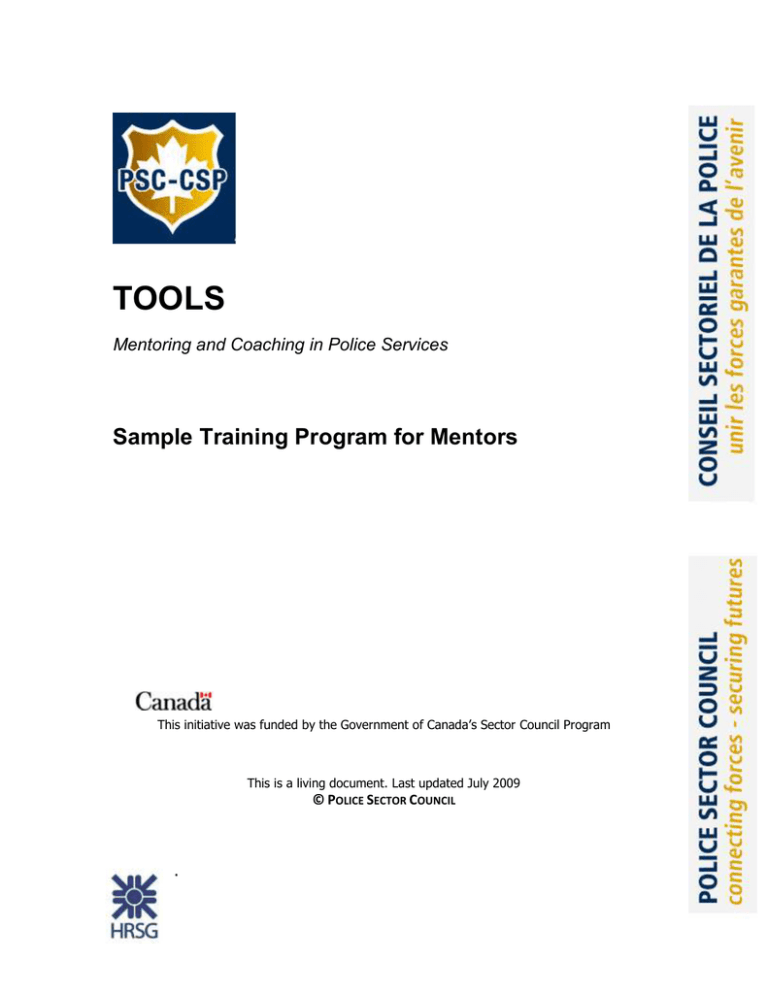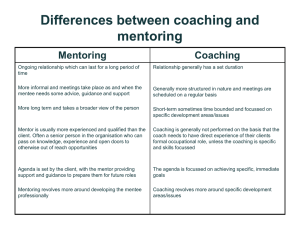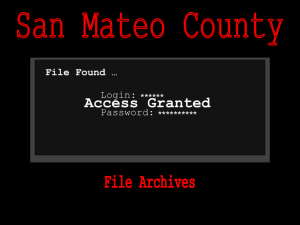Draft Content for Mentoring and Coaching Guide
advertisement

TOOLS Mentoring and Coaching in Police Services Sample Training Program for Mentors This initiative was funded by the Government of Canada’s Sector Council Program This is a living document. Last updated July 2009 © POLICE SECTOR COUNCIL . Sample Training Program for Mentors Stage 1: “Mentoring and Coaching Skills: A Workshop for Senior Leaders” A two-day workshop on basic mentoring and coaching skills for mentors that: Increases self-knowledge Engages the participant leader as a Mentor/Coach Provides a starter kit for developing essential coaching and mentoring skills The program includes assessments and debriefs on thinking, behavioural and leadership styles as well as skills training and applied practice on: Essential mentoring and coaching skills: Relationship building Giving and receiving feedback Active listening skills Creating a learning mentoring/coaching culture The art of questioning Action planning The role of self-awareness issues in mentoring and coaching Benefits and barriers to good mentoring and coaching Handling sensitive and difficult mentoring/coaching Reflective practice Designing an individual action plan for mentor development Stage 2: “Using Assessments in Mentoring and Coaching” This training offers opportunities for mentors and coaches to become familiar with the assessment tools used in the Leadership Development Program. The training includes: Familiarization with the assessment tools to be used in the mentoring and coaching program Instruction on how to use assessment results for developmental planning Discussions on how to use assessment results to assist leadership program participants identify their own developmental goals and how to link results to participants’ realities, experiences, and program goals This program should be delivered by someone trained in assessment methodology. Theory on assessment can be provided individually, to a group or as a webinar. One-on-one scheduling accommodates the busy schedules of senior staff. Stage 3: A series of Coaching Skills Transfer Workshops Opportunities to anchor and fine tune mentoring and coaching skills can be offered through smaller sub-group meetings where participants working in triads could practice and receive feedback on a range of mentoring/coaching skill areas such as: Goal setting Developmental Learning Plan Coaching conversations Creating motivation for change Handling difficult situations Dealing with resistance “Fit” and boundary issues Codes of conduct Stage 4: Post-training Follow-up Conversations In-person or telephone follow-up conversations with the program manager or coach help consolidate mentors’ learning and insights. This not only communicates support for mentor development but also models the coaching process overall. Stage 5: Building a Community of Mentors and Coaches Creating opportunities for mentors and coaches to share their experiences is a valuable development practice that sustains program interest, motivation and commitment. It also helps to build a mentoring and coaching community where mentors and coaches can share experiences and build important supportive relationships. Some suggested venues for mentors and coaches to communicate and share information include: Interactive webinars Meetings Social gatherings Telephone conferences Opportunities to work together on initiatives such as writing articles, speaking at conferences, and peer coaching on mentoring and coaching skills.





